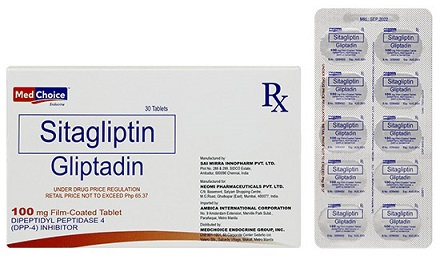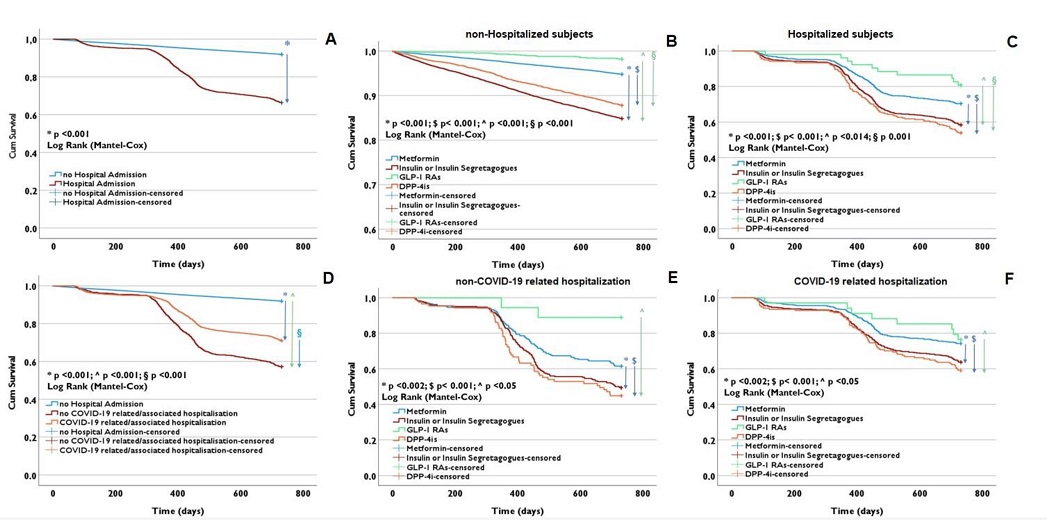Game-Changing Diabetes Drugs Show Remarkable Impact On COVID-19 Survival - Two-Year Observational Study Unveils Potential Lifesaving Benefits
Thailand Medical News Team Aug 19, 2023 2 years, 6 months, 2 days, 22 hours, 4 minutes ago
COVID-19 Drugs: In a new study conducted by a consortium of esteemed medical institutions including the University of Ferrara-Italy, SS. Annunziata Hospital-Italy, University Hospital of Ferrara Arcispedale Sant’Anna-Italy, and Azienda Unità Sanitaria Locale della Romagna-Italy, the potential life-saving effects of novel antidiabetic drugs, specifically GLP-1 receptor agonists (GLP-1 RAs) and DPP-4 inhibitors (DPP-4is), in the context of the COVID-19 pandemic have come to light.

The research, which spanned over two years, investigated the impact of these innovative medications on hospitalization rates, in-hospital mortality, and two-year mortality among individuals with type 2 diabetes mellitus (T2DM). The findings, which could revolutionize the management of diabetes and enhance the arsenal against COVID-19, reveal an encouraging new avenue of treatment that warrants further exploration.
The hypothesis driving this
COVID-19 Drugs study is rooted in the anti-inflammatory properties exhibited by GLP-1 RAs and DPP-4is. Beyond their glucose-lowering abilities, these drugs have been observed to counteract inflammation, making them potential candidates for battling the hyperinflammatory state characteristic of COVID-19.
As the pandemic wreaked havoc worldwide, study team embarked on a mission to assess whether these antidiabetic agents could wield their anti-inflammatory prowess against the ferocity of the virus.
Diabetes, a known cardiovascular risk factor, had already been associated with increased susceptibility to severe forms of COVID-19. The link between the two conditions was not only in their respective impacts on the immune system, but also in the molecular interactions that enable the virus to infiltrate cells. SARS-CoV-2, the virus behind COVID-19, exploits the angiotensin-converting enzyme 2 (ACE2) receptor to invade cells.
This very receptor also plays a significant role in diabetes-related complications. The intricate connections between diabetes and COVID-19 underscored the urgency of exploring potential therapies that could mitigate the double-edged risks faced by individuals with T2DM.
The study's objectives were comprehensive: first, to compare hospitalization rates between T2DM patients on GLP-1 RAs or DPP-4is versus those on alternative treatments; second, to assess the length of hospital stays for each group; and third, to evaluate all-cause and COVID-19-related mortality rates over the two-year study period. The researchers harnessed real-world data to conduct retrospective analyses, logistic regression models, and survival curve tests to delve into the impact of these drugs on the clinical outcomes of COVID-19 patients.
Strikingly, the study revealed that individuals receiving home therapy with GLP-1 RAs showcased significantly lower mortality rates, even extending beyond the acute phase of COVID-19. The benefits were evident both within and outside hospital settings, highlighting the potential of these drugs to confer long-term protection against adverse outcomes.
The study findings painted a vivid picture of GLP-1 RAs acting as formidable guardians, shielding
T2DM patients from the clutches of COVID-19.
The mechanisms behind these encouraging findings stem from the unique anti-inflammatory effects of GLP-1 RAs and DPP-4is. These drugs wield the power to transform monocyto-macrophagic cells into the anti-inflammatory M2 phenotype, while simultaneously quelling the production of inflammatory cytokines. These actions translate into real-world benefits, as demonstrated by a substantial reduction in in-hospital mortality among COVID-19 patients treated with the DPP-4 inhibitor sitagliptin. Notably, the study also found reduced risks of mechanical ventilation and admission to intensive care units in patients receiving sitagliptin treatment.
 Mantel–Cox log-rank tests. Analysis of two-year survival among diabetic subjects subcohorts. Differences in terms of cumulative survival between hospitalised and non-hospitalised subjects (A); cumulative survival among non-hospitalised subjects based on antidiabetic treatment (B); cumulative survival among hospitalised subjects based on antidiabetic treatment (C); differences in terms of cumulative survival among non-hospitalised, hospitalised for COVID-19 and hospitalised for other reasons (D); cumulative survival among subjects hospitalised for other reasons based on antidiabetic treatment (E); cumulative survival among subjects hospitalised for COVID-19 based on antidiabetic treatment (F).
Mantel–Cox log-rank tests. Analysis of two-year survival among diabetic subjects subcohorts. Differences in terms of cumulative survival between hospitalised and non-hospitalised subjects (A); cumulative survival among non-hospitalised subjects based on antidiabetic treatment (B); cumulative survival among hospitalised subjects based on antidiabetic treatment (C); differences in terms of cumulative survival among non-hospitalised, hospitalised for COVID-19 and hospitalised for other reasons (D); cumulative survival among subjects hospitalised for other reasons based on antidiabetic treatment (E); cumulative survival among subjects hospitalised for COVID-19 based on antidiabetic treatment (F).
Interestingly, GLP-1 RAs' protective effect may be linked to their influence on the renin-angiotensin system (RAS), a key player in COVID-19 pathology. These drugs have been shown to counteract right ventricle hypertrophy and promote the production of critical pulmonary surfactant proteins. Moreover, GLP-1 RAs' ability to modulate ACE2 expression and balance the RAS has implications not only for COVID-19 but also for the broader spectrum of diabetes-related complications.
The study, while groundbreaking, is not without limitations. Retrospective analyses based on administrative data may present challenges, and the sample sizes across different cohorts varied. The study emphasizes the need for further research and clinical trials to validate and deepen the understanding of GLP-1 RAs' potential impact on COVID-19 outcomes.
Additionally, while the study's focus was on GLP-1 RAs and DPP-4is, the broader spectrum of antidiabetic medications, including metformin and SGLT-2 inhibitors, also warrants continued investigation.
As the world continues to grapple with the repercussions of the COVID-19 pandemic, the emergence of GLP-1 RAs and DPP-4is as potential allies against the virus offers a glimmer of hope. These antidiabetic drugs, known for their ability to go beyond glucose regulation, are proving to be potent weapons against the inflammation-driven storm that is COVID-19.
The study findings were published in the peer reviewed journal: Biomedicines.
https://www.mdpi.com/2227-9059/11/8/2292
For the latest on
COVID-19 Drugs, keep on logging to Thailand Medical News.

